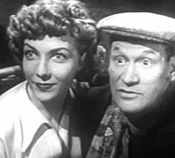| Take Me to Paris | |
|---|---|
 Claire Guibert & Albert Modley | |
| Directed by | Jack Raymond |
| Written by | Max Catto |
| Produced by | Henry Halstead |
| Starring |
|
| Cinematography | James Wilson |
| Edited by | Helen Wiggins |
| Music by | Percival Mackey |
Production company | Byron Films |
| Distributed by | Associated British-Pathé |
Release date |
|
Running time | 72 minutes |
| Country | United Kingdom |
| Language | English |
Take Me to Paris is a 1951 British comedy film directed by Jack Raymond and starring Albert Modley, Roberta Huby and Bruce Seton.[1] It was written by Max Catto and made at Walton Studios.[2]
Mr. Armstrong's racing stable is preparing to send one of its top horses to run in Paris's Maisons Lafitte, when the thoroughbred is unexpectedly injured. Its replacement is Thunderhead, a much lowlier animal, but favourite of jockey and stable lad, Albert. Meanwhile, two crooked stable hands plot to use the cross channel trip to smuggle forged bank notes in the horse's blanket. Their plans are foiled however, by Albert, who also manages to win the big race riding his favourite horse.
The Monthly Film Bulletin wrote: "Trivial, quite pleasant, but inexpertly made."[3]
Kine Weekly wrote: "It is too clumsily timed to make good 'thick ear,' and far too dependent upon corny cracks to rock the screen with laughter. Albert Modley, the well-known Yorkshire comedian, is the star, but he is unable to adapt himself to an alien environment. The one redeeming feature is Claire Guibert, a comely and unaffected youngster, cast as the French heroine. Solely for the unsophisticated."[4]
Picturegoer wrote: "This picture made me squirm. The story is stupid, the direction loose and there's a glaring lack of attention to detail. ... In order to justify the title the producers have injected shots of Paris. Even they are laboured."[5]
Picture Show wrote: "Lively comedy ... It has a hard-working cast and first-rate Paris settings."[6]
In British Sound Films: The Studio Years 1928–1959 David Quinlan rated the film as "mediocre", writing: "Silly comedy has just the occasional nice moment."[7]